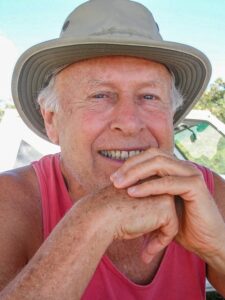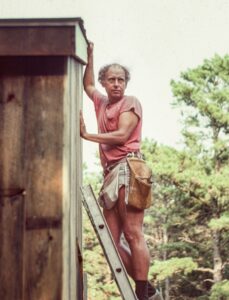Brent Harold, a teacher, builder, and prolific writer with an indomitable and independent spirit, died at his home in Wellfleet on Oct. 29, 2024, attended by family and close friends. The cause was metastatic prostate cancer. He was 86.

Brent wrote seven books about his travels, his memoirs, and his literary and personal obsessions. The final one, a collection of poems titled In the Middle and at the Edge, was at the printer when he died.
He was a college professor of English who, he wrote, “slowly transformed myself from an academic, expertise-based writer to a freelancer and writer of op-ed newspaper columns.” He kept a journal starting at age 19, writing in it every day, and over almost 30 years he wrote more than 500 columns for the Cape Cod Times. He was also a talented artist who filled his home, which he designed and built with his wife, Susan Weegar, with his own spare drawings.
Brent was born in New York City on Jan. 29, 1938 to Charlotte Webber and Charles Louis Harold. He grew up in Pleasantville, N.Y. and graduated Phi Beta Kappa and summa cum laude from Brown University in 1960. He was a Woodrow Wilson fellow at Stanford University, where he earned a Ph.D. in 1968. He subsequently taught at Brown, Trinity College, Wesleyan University, the University of Hartford, and the New School for Social Research. He was a founding member of Radical Teacher magazine.
“He was a provocateur from the word go,” said his sister Ellie. “He was doing this radical, student-centered teaching. He wasn’t particularly into lecturing. He was always bopping around in one of several VWs and a very sturdy Volvo. He did love houses. Once he bought his house in Hartford, he got into carpentry and saw that as an alternative to an academic lifestyle.”
“Wellfleet was one of many places Brent fell in love with,” said Susan. “He didn’t really like to travel. He liked to go places, settle in, and be a resident.”
An early marriage to a Brown classmate had brought him to Wellfleet for the first time in September 1959. For their honeymoon, they camped on the beach. It was the same week that the Cape Cod National Seashore legislation was introduced in Congress. That marriage ended in divorce after three years.
Brent moved to California for graduate work and in 1968, with nine friends, bought 20 acres near the Donner Pass in a remote area of the Sierra Nevada. His notes on his experiences there eventually became a book, Owning the Sierra Nevada: The Short History of a Long Infatuation, published in 2006. “In the 38 years he has owned the land, Harold has spent no more than three to four months on it, but its importance in his life looms large,” wrote Susan Salter Reynolds in a Los Angeles Times review. “It’s a simple little book about decades of yearning.”
Other places that Brent fell in love with over the years included the Puerto Rican island of Vieques, where he and Susan bought a house with two other couples in 1994, Tucson, southern France, and Oaxaca and San Miguel de Allende, Mexico. But Wellfleet was his truest home.
He and Susan had met in 1977 when he was living in Hartford. They bought their Wellfleet land, on Old Long Pond Road, in 1983 and built a cabin called “the Hovel,” where they lived while they built a larger house a short way up the hill. After making the move from Hartford to Wellfleet in 1992 with their five-year-old son, Ben, they continued to make additions to the main house, including an ingeniously designed greenhouse and sitting room that helped heat the main house in winter.
Brent had not formally studied architecture or construction. “He was a self-taught designer, artist, and everything else,” said Susan. “He had insatiable curiosity. He was constantly asking questions and putting together what he had learned. He taught himself how to build a house, sail a sailboat, play the banjo.”
The experience of building turned into another book, Life as a House, published in 2011. “It’s about how it feels to tear down a wall — wondering if it’s holding anything up,” Brent wrote. “There is even what may be the most complete description in literature of what it feels like to fall off a ladder.”

In 1996, he published Bodywork, a book of drawings and essays, and in 2003 his book Wellfleet and the World: Themes of a Cherished and Threatened Place. “Brent Harold writes about his adopted town with uncommon wit and literary grace,” wrote Robert Finch. It was “a good read for all seasons,” wrote Howard Zinn.
A familiar speaker at Wellfleet town meetings, Brent loved a good argument, and in his columns he wrote with passion against plans to put cell-phone towers in town, against formula businesses like Dunkin’ Donuts, and about the dangers of the Pilgrim Nuclear Power Station, among other controversies.
“Brent was a sensualist,” said Susan. “He loved food — the taste and the smell of it. He loved the smell of the ocean. He loved lying on sand and rocks. He loved his fingers going through the cat’s fur, and the shape of the human body, men and women alike.”
He was also devoted to physical activity, swimming, sailing, skiing, and, wherever he was, always looking for places to go for a run. Even in the latter stages of his cancer, he lifted weights.
He spent the last day of his life exactly as he had wanted, in a comfy recliner in the living room, surrounded by his loved ones. “We had margaritas and looked at old photographs,” said Susan, “and he told stories about each photo, here in the house we built together.”
Brent is survived by his wife, Susan Weeger of Wellfleet; his son, Ben Harold, daughter-in-law Amanda Kane, and grandchildren Sawyer, Sutton, and Emilia Harold of Orleans; his sisters, Ellie Harold of Frankfurt, Mich. and Polly Harold of Cambridge; and his brother, Robert Harold, of Georgia. He was predeceased by his sister Beeby.
His body has been donated to the Boston University Medical School through its anatomical gift program.
Brent’s final book ends with the poem “Early December Dusk on Long Pond Road” and these lines: “I think of this life, this world of ours/ unto itself, (though yearningly we scour the heavens/ for our twin), our knowing swaddled/ by what’s beyond it,/ all our cherished comprehension/ comprehended, embraced by the whole/ of which we are a part./ May I fashion of the encroaching dark a nest/ in which to put myself to rest.”



